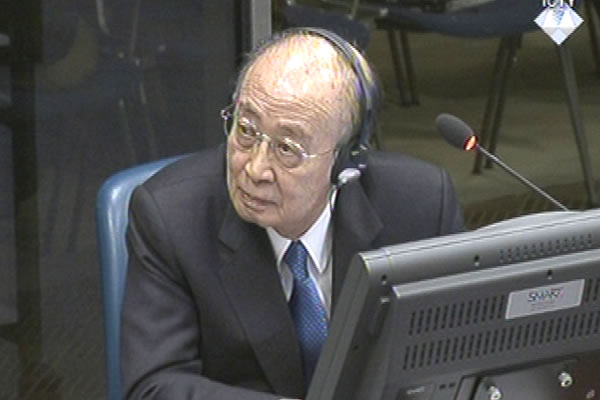Home
AKASHI'S 'THINKING OUT LOUD' ABOUT MLADIC
In his book Yasushi Akashi, former UN Secretary General' special envoy to the former Yugoslavia, described Ratko Mladic as an 'emotional nationalist' with 'strong feelings for lives of Serbs but without any emotion for the members of the two other BH ethnicities'. In Akashi's words, Mladic was a soldier immersed in the idea of the 'Serb supremacy', 'prone to taking revenge'. Today Akashi distanced himself from the allegations, claiming that he was 'not an historian'. In his book, he was just 'thinking out loud', Akashi remarked
 Yasushi Akashi, defence witness at Rako Mladic trial
Yasushi Akashi, defence witness at Rako Mladic trial Yesterday, in his evidence in Ratko Mladic's defense Japanese diplomat Yasushi Akashi repeated his previous claim that Radovan Karadzic was a man with 'a tendency to bend the truth'. As prosecutor Tieger probed the issue further today, he focused on the situation in Banja Luka and Bijeljina in 1994. The prosecutor put it to the witness that the truth had been bent then, as the Bosnian Serb president told Akashi and other international representatives one thing, and did something completely different in the field.
Several of the presented documents showed that in August 1994 the witness and other UN representatives received reports about the ethnic cleansing in the Bijeljina municipality and the violence against the local non-Serbs in the villages of Janja and in Banja Luka. Also, the prosecutor argued, it was a well-known fact that the local boss Vojkan Djurkovic was in charge of the expulsions and looting and that Serb soldiers were put up in the houses and apartments vacated by the non-Serbs. As noted in a document by the VRS Eastern Bosnia Corps, these actions 'raised the morale of the troops'. These facts were conveyed to Karadzic who promised he would put a stop to any further ethnic cleansing. At the same time Karadzic said before the Assembly that it would be a 'catastrophe' if any Muslims remained in the Serb territory. Akashi didn't remember that particular instance, noting instead that the UN mission was helpless to prevent the ethnic cleansing.
Also, the witness and his colleagues were unable to secure the presence ofthe International Red Cross in Srebrenica after Mladic's army entered the city. 'All our efforts to that effect were futile', Akashi stressed, adding that thus they could not verify ifthere was any truth in the 'rumors' about the massacre of captured Srebrenica locals. According to the prosecution evidence, the mass executions were reported in the foreign media days after they took place. Akashi replied that in mid-August 1995 his colleagues and he were still 'uncertain' although a month had passed from the massacre.
In his book, Akashi describes his experience from 1994 and 1995 when he was the UN Secretary General's special envoy to the former Yugoslavia. The witness described Mladic as an 'emotional nationalist' with 'strong feelings for the lives of Serbs but without any emotion for the members of the two other BH ethnicities'. Also, Akashi wrote that Mladic was immersed in the idea of the 'Serb supremacy' and was 'prone to taking revenge'. According to Akashi's book, that could have been the cause of the events in Srebrenica. Asked if he still held the same views of the accused, Akashi replied that he was 'not an historian'. In his book he was only 'thinking out loud', Akashi told the court, presenting his assumptions about Mladic based on their encounters.
In his book, Akashi notes the opinion of British general Michael Rose that the genocide 'was never part of the Bosnian official policy unlike the Bosnian Serbs'. Yesterday Akashi said that he agreed entirely with the allegation. Today, in the re-examination the witness again showed the same tendency to favor both parties in the proceedings, as he told defense counsel Ivetic that he didn't agree '100 per cent' with general Rose. This prompted the prosecutor to ask Akashi to explain the discrepancy what he said yesterday and today. Akashi told him that he did agree with Rose's 'general description'. After that, there was no time for any further questions. In his last appearance before the Tribunal, Akashi thus managed to remain diplomatically vague.
Ratko Mladic's trial continues tomorrow with the evidence of his military expert Mitar Kovac.
Linked Reports
- Case : Mladic
- 2015-11-23 'QUANTUM DIFFERENCE' IN CRIMES
- 2015-11-19 SARAJEVO CIVILIANS LACKED ‘SAFETY CULTURE’
- 2015-11-18 ‘PLAGIARISM’ IN MLADIC’S EXPERT REPORT
- 2015-11-25 EVERYONE IS TO BLAME FOR SREBRENICA GENOCIDE EXCEPT MLADIC AND KARADZIC
- 2015-11-30 HISTORIAN CORRECTS GRAMMAR
- 2015-12-01 HOW WITNESSES IN VOJISLAV SESELJ’S CASE WERE MADE TO ‘CHANGE THEIR MINDS’
